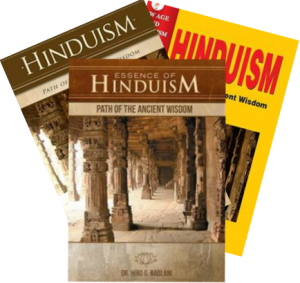In the Hindu pantheon, soul has been very firmly eulogized. Soul is the most powerful; body, mind, and intellect, in comparison, are fleeting and transient, even an illusion. Our body and all material objects are in a constant state of change, but the soul is regarded as eternal and imperishable.
Hindu philosophy envisages two types of bodies: the physical or gross body (called thul sarira) and the subtle, invisible body (called suksma sarira). Soul has been identified as the subtle, immortal, transcendental suksma sarira.
Hindu seers have often referred to a conflict between heart and brain—not the anatomical heart in our bodies but the soul heart of the suksma sarira.
As Swami Vivekananda says:
“It is the heart, which takes one to the highest plane, which intellect can never reach; it goes beyond intellect and what is called inspiration.”36
According to Hindu philosophy, soul is the eternal constituent, which is invisible and metaphysical in nature and acts as a vehicle for reincarnation from one body to another. It also carries within it the notation of the past karmas, as well as a genealogy map of our tendencies, the vasnas.
It is the eternal and transcendental nature of the soul that kindles the flame of fearlessness, or abhay, in human beings. Lord Krishna tells Arjuna: “Thou art the reservoir of omnipotent power. Arise, awake and manifest the Divinity within.”37
Knowing the true self, the higher self, is true knowledge (called para vidya). Hindu seers are taught to disentangle themselves from the false, superficial ego-self (neti neti—“I am not this”) and instead, to assert, “I am that” (tat twam asi). Soul is the divine seed in each being.
Death, in Hindu philosophy, is part of the long, immortal life, which has been described as the great journey, or mahaprasthana. Death is a sacred event, punctuating intermittently in this mahaprasthana. Death is considered merely an interlude in the long passage of the soul, one that one should neither fear nor look forward to prematurely. When the karma of this life is over, one passes over to the next journey.
Even though the soul has been identified as the true representative of an individual being, the physical body and the death of it have been a subject of great consequence. A Hindu is expected to take full advantage of precious human life, which is the essential tool for the spiritual evolution of the soul through eons of birth cycles. Death can be a relief, especially for people who have ben ill for long time, and have endured much pain and discomfort. Also saints like Ramana Maharshi, Ramakrishna, Sivananda, and Vivekanada contracted life-threating diseases. Although their bodies suffered, they did not feel helpless and depressed, because they did not identify with their body or ego. Knowing the deeper truths of life, and living in awareness of true immortal identity, they died in peace.
The soul, or atman, is considered to be the seed of the Divine, which has all the potential to become godlike, if nurtured and cultivated properly. As the individual human soul (the jivatman) becomes more pure, free from the impurities of many tendencies (vasnas), it becomes more divine in nature. Thus, the jivatman—the individual human soul—has the seed potential of the Divine but is not the Divine itself. It needs to be purified of all its egoistical nature in order to become godlike and merge into the Divine (known as paramatman).
Hindu seers have outlined an evolutionary path for an individual toward spiritual maturity. In the words of Satguru Sivaya Subramuniyaswami:
“Our individual soul is the immortal and spiritual body of light that animates life and reincarnates again and again until all the past karmas are resolved and its essential unity with God is fully realized.” 38
The incarnation of God (avtar-karan) is repeatedly observed in Hindu tradition. These divine souls guide humanity to discover spiritual truths. Acceptance of multiple God incarnations has helped Hindu philosophy to grow continuously and remain ever fresh; this has been the Hindu way. According to Sri Ramakrishna, a God incarnate is like a big ship that can carry many people, while a human saint is like a small boat.
A leading senior monk of the Vedanta Temple of New York, Swami Yogatmananda, shared the following anecdote:
“Once, many devotees met with God and asked Him how they all might meet with the Divine. God told them that they might ascend the high ladder of virtues and austerities and reach Him, ultimately. The devotees then told God how difficult this route would be for most of them, and only a rare few would ever reach this goal. God agreed. The devotees then put a proposal to God for consideration: Would it not be a good idea, if instead, God would use the same ladder and come down occasionally to meet with many devotees at one time?” 39
The concept of eternal soul and reincarnation, although essentially a Hindu doctrine, has many supporters in other faiths, too. A cross section of people that includes industrial magnet Henry Ford, renowned author Victor Hugo, Christian Unitarian minister Rev. William R. Alger, and innumerable others have accepted this philosophy. In fact, in a 1990 Gallup poll, it was revealed that the percentage of Christians who believe in reincarnation is about the same in the general population as the percentage of those who do not believe in this concept.40 Reincarnation, though not yet accepted by the modern science, instances of child prodigy and many recorded cases of persons remembering compelling details of previous life, does tilt the evidence very considerably in favor of this phenomenon.
For Hindus, the “soul” (atman) is an eternal, transcendental, formless phenomenon, which is manifested through physical bodies repeatedly passing through eons of life cycles. According to Hindu philosophy, just as the physical body parts and intellect develop over many years of life, so the individual soul (jivatman), which is but a seed of the divine “paramatman”, too develops though eons of life cycles. The soul matures and progresses by cultivating spiritual virtues; these divine merits are deemed more worthy in Hindu philosophy than any physical or material asset. The evolutionary development thus exceeds much beyond one life cycle in Hindu theology.




